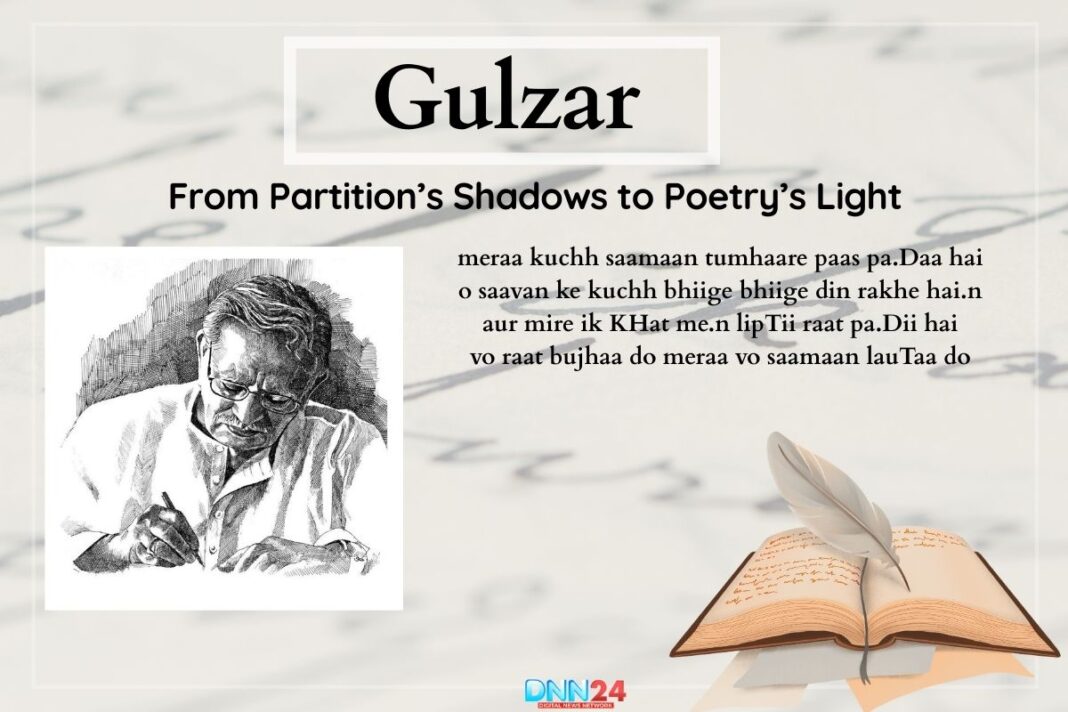Makhmoor Saeedi was born on December 31, 1938, in Tonk, Rajasthan—the land where the air hums with the melodies of Urdu poetry and folklore. His original name was Sultan Mohammad Khan but he had the pen name Makhmoor. His father, Ahmad Khan Nazish was a renowned Urdu poet and thus little Makhmoor grew up in a home full of verses, rhythm and heated debates on life and literature.
muddaton baad hum kisi se mile
Makhmoor Saeedi
yun laga jaise zindagi se mile
Early in life his heart had heard the dreams and the pulses of poets, and at the age of ten he had written his first poem. His learning process started under the rustic conditions of Tonk where he heard village elders reciting poetry by the light of lantern, and was taught to find beauty not only in words, but in the toil of everyday life.
likh kar waraq-e-dil se miTane nahin hote
Makhmoor Saeedi
kuchh lafz hain aise jo purane nahin hote
Makhmoor was deeply connected with his tradition and within a short time, he abandoned his small town to join Agra where he got his degree and developed as a thinker and a creator. His basic understanding of poetry in his family, and the intimacy of village life, had led to his basic, emotional, and inclusive world view-the world he would later fill with every couplet he wrote.
san li sada-e-koh-e-nida aur chal paDe
Makhmoor Saeedi
hum ne kisi se kuchh na kaha aur chal paDe
The Burden and Blessing of a Poet’s Struggle
Leaving Tonk and entering the active literary circles in Delhi, young Makhmoor was entering a world of both excitement and suffering. He was not given a clear passage in spite of the poetic heritage of his father. His childhood in Delhi was marked with financial issues, uncertainty and self-doubts.
gham o nashat ki har rahguzar mein tanha hun
Makhmoor Saeedi
mujhe KHabar hai main apne safar mein tanha hun
Makhmoor started his career by accepting editing assignments with magazines such as Tahreek, and in most cases he had to work long hours with very little remuneration to sustain himself.The city had engulfed him and nothing could be done to prevent it, but its conflict gave the mother of some of the most touching lines of his.
faza mein kaisi udasi hai kya kaha jae
Makhmoor Saeedi
‘ajib sham ye guzri hai kya kaha jae
He once said, “My entire life, I struggled and fought with myself so, don’t complain”. This spiritual struggle became a blessing- his work started to show profound truths of alienation, victory and hope. His frustrations would sometimes push him to the point of giving up but he would find solace and an outlet in his poetry. His poems, and in particular his melancholic poems or shayari, were a reflection of many who were invisible, neglected or deceived. Makhmoor did not hide his scars, rather he made them into ink.
ek bar mil ke phir na kabhi umr bhar mile
Makhmoor Saeedi
do ajnabi the hum jo sar-e-rah-guzar mile
Love, Pain, and the Untold Human Stories
In the poetry of Makhmoor is hidden a treasure of stories unheard of about people, glimpses of joy, sorrow and moments of realization that pass us by. In the background of each of the poems stands the soul of a man, who has keenly watched the world and the heart of his own self.
aa gaya ho na koi bhes badal kar dekho
Makhmoor Saeedi
do qadam sae ke hamrah bhi chal kar dekho
There’s a well-shared anecdote about Makhmoor’s meeting with the late actor Irrfan Khan in Jaipur: Irrfan, also from Rajasthan, once quoted a Makhmoor couplet to express a moment of loss: “Ghar Mein Raha Tha Kaun Ki Rukhsat Kare Humein/ Chaukhat Ko Alvida Kaha Aur Chal Pade” (Who was at home to bid me farewell?/ I said goodbye to the threshold and left). This couplet sums up the solitude of leaving-home-a theme that resonated throughout his life as he frequently changed cities and communities in search of hope, love and belonging.
shahar ujDe hue KHwabon ke basae kya kya
Makhmoor Saeedi
nind mein hum ne dar-o-baam sajae kya kya
Makhmoor did not seek popularity in crowds and in flattery as other poets did. He thought that “When you wrote with a strong quill, praise would go your way.” He was never after sincerity, it was the honesty of his verses that made him reach people not through the social circles. In the daily life, be it in the betrayal or the recollection of the coziness of the community, Makhmoor wrote what he lived and lived what he wrote.
kasak purane zamane ki sath laya hai
Makhmoor Saeedi
tera KHayal ki barson ke baad aaya hai
Champion of the Common Language: A Legacy in Words
Makhmoor Saeedi was not just a master of traditional Urdu ghazal; he pushed boundaries by experimenting with new forms—writing qataa, rubai, geet, and doha with equal finesse. He was hailed as a person who has combined old world charm of urdu poetry with the modern sensibility.
kitni diwaren uThi hain ek ghar ke darmiyan
Makhmoor Saeedi
ghar kahin gum ho gaya diwar-o-dar ke darmiyan
He did not want to live to get applause, but instead, he wanted to stick to his roots. He is included in the list of pioneers who brought Urdu literature to the masses irrespective of their classes or castes. His works such as Sabrang, Awaaz ke Jism, Deewar-o-dar ke Darmiyan, and his award-winning work Rasta Aur Main, which fetched him the Sahitya Akademi Award in 2007, are testimonies of longing, transition and the eternal journey of man.
ye kaisa rabt hua dil ko teri zat ke sath
Makhmoor Saeedi
tera KHayal ab aata hai baat baat ke sath
His poetry permeated classrooms, literary groups and even ordinary households and became a healing balm to bruised hearts and an inspiration in everyday challenges. Makhmoor too spent a large part of his life in fostering young talent, as an editor, mentor, advisor and always tried to make sure that Urdu literature would continue to sing in future generations.
jaanib-e-kucha-o-bazar na dekha jae
Makhmoor Saeedi
ghaur se shahr ka kirdar na dekha jae
The Living Flame: Inspirations for Today
Maybe that is why the journey of Makhmoor is so memorable the way his life has remained a lesson to us. He had his share of hardships, rejections and loneliness but he never ever let the bitterness in his verses. Rather, he made connections–with traditions and with new thinkers, between regions and generations.
KHwar-o-ruswa na sar-e-kucha-o-bazar mile
Makhmoor Saeedi
hai yahi ishq ka eazaz sar-e-dar mile
His faith in the worth of the common man, his openness to those who were outcasts, his demand that poetry be true to itself–these are the things that make him more than a poet, but a teacher on the way of life.Makhmoor once stated that he did not wish to be remembered as a poet only but as a human being.
mujh mein kisi ka aks na partaw KHali aaina hun main
Makhmoor Saeedi
mere TukDe kaun sameTe ab TuTun ya bikhrun main
This is not only his humility, but coupled with his creative power, makes his story as relevant and touching as it ever was. Through the ups and downs, Makhmoor Saeedi teaches us that life is a poem in constant revision and that even when the world refuses to applaud, the greatest satisfaction comes from writing and living, honestly, courageously, and with love.
chaDhte dariya se bhi gar par utar jaoge
Makhmoor Saeedi
panw rakhte hi kinare pe bikhar jaoge
Also Read: Talib Chakwali: A Life Woven in Words, Loss, and the Search for Meaning
You can connect with DNN24 on Facebook, Twitter, and Instagram and subscribe to our YouTube channel.



